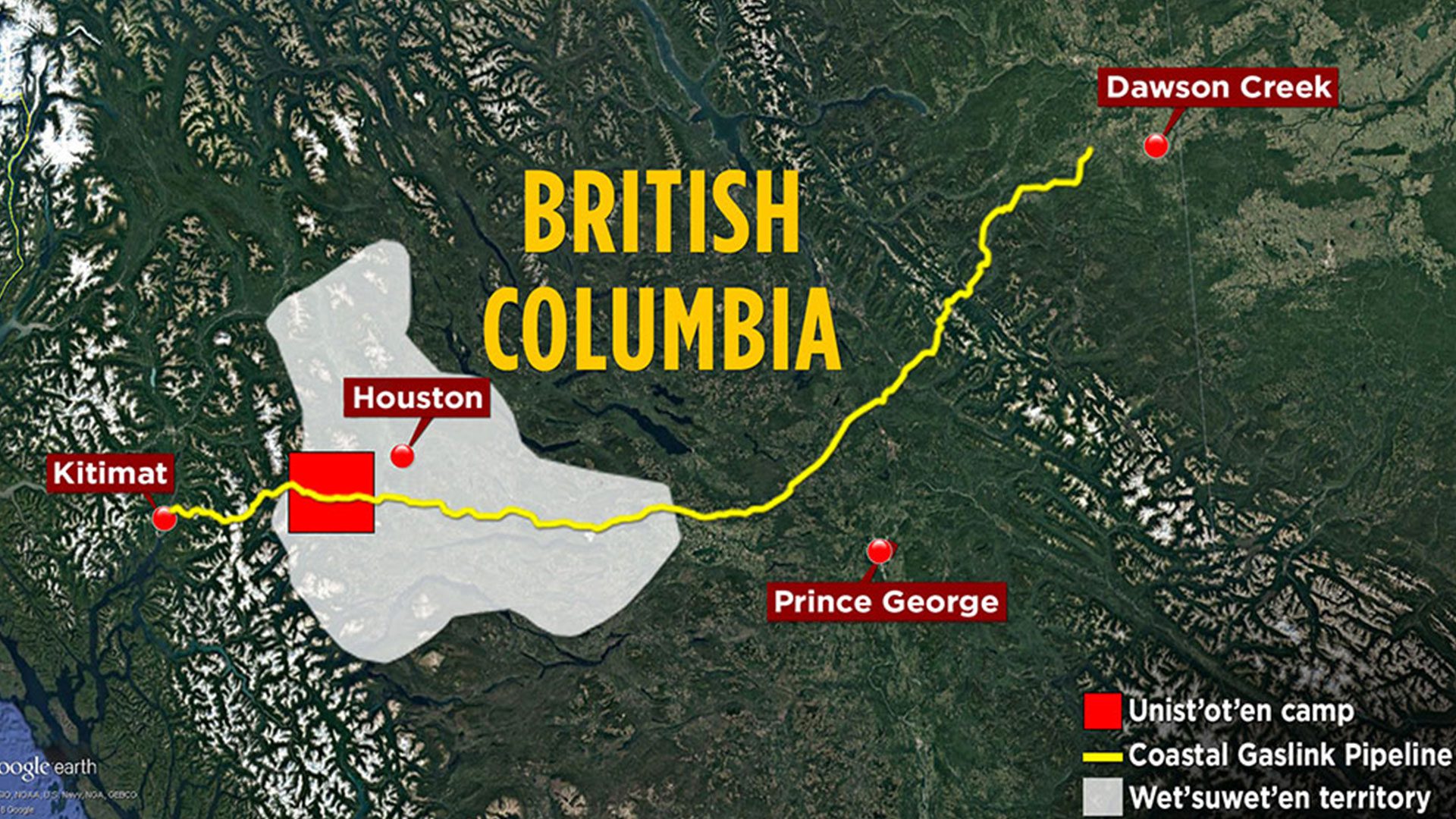Weeks after the United Nations Committee on the Elimination of Racial Discrimination (CERD) issued a letter urging Canada to stop construction of the Trans Mountain pipeline expansion project and Coastal GasLink pipeline over concerns about Indigenous rights and abuses committed by police, Secwepemc and Wet’suwet’en leaders issued their own decree.
Sleydo’ Molly Wickham, the spokesperson of the Gidimt’en Access Point, says the RCMP arrests in Wet’suwet’en territory are a violation of their rights.
“When I read the third letter from CERD, I felt overwhelmed by the recognition that our experiences are a violation of international human rights and Indigenous rights, the construction of the Coastal Gaslink pipeline project and the RCMP treatment of me and other land defenders is a violation of our humanity as Indigenous people,” she said.
The letter chastises Canada and British Columbia for what it calls the “criminalization of land defenders and peaceful protesters” on these territories.
“According to the information before the Committee, the Governments of Canada and of the Province of British Columbia have escalated their use of force, surveillance, and criminalization of land defenders and peaceful protesters to intimidate, remove and forcibly evict Secwepemc and Wet’suwet’en Nations from their traditional lands, in particular by the Royal Canadian Mounted Police (RCMP), the Community-Industry Response Group (CIRG), and private security firms,” says a letter from Verene Shepherd, chair of CERD.
“The information received specifies in particular that the Tiny House Warriors, a group of Secwepemc women, have been the target of surveillance and intimidation, and that numerous Secwepemc and We’suwet’en peaceful land defenders have been victims of violent evictions and arbitrary detentions by the RCMP, the CIRG and private security personnel in several occasions since the Committee’s letter to the State party, dated 24 November 2020.”
The committee is also making several demands including a halt to further construction and the launch of an investigation to, “Prevent and duly investigate the allegations of surveillance measures, practices of arbitrary detention, instances of excessive use of force against protesters, in particular those belonging to the Secwepemc and Wet’suwet’en peoples, by the RCMP, CIRG, and private security firms,” says the letter.
Indigenous rights experts and anti-pipeline advocates from Wet’suwet’en, Secwepemc and Tsleil-Waututh Nations, held a press conference calling for the stop of two pipelines.”
The April 29 letter from CERD also calls for an investigation of RCMP actions against protesters.
Wet’suwet’en Hereditary Chief Woos shared the message that the governments need to sit down with them for talks.
“They need to sit down with us in a proper way and sign a peace treaty with us,” he said. “We are peaceful, we continue to peaceful, it is them that come in with their guns pointed as us.
“It is them that they have these heavy militarized-style pushing us around, pushing people around, women that are pregnant.”
In Sepwemec territory, Kanahus Manuel, spokesperson from The Tiny House Warriors, shared her experiences opposing the Trans Mountain Pipeline’s expansion project.
Manuel says they expressed their concerns in Canada but now are voicing their concerns to the international community.
“To express the human rights violations that are happening in Canada and these other International institutions are recognizing that human rights are being violated here in Canada, insurance companies are starting to walk away from this project, financiers, etc.,” she said.
APTN News reached out the federal ministry of Natural Resources asking for a comment on the letter from the UN.
In an email, Keean Nembhard, press secretary for the minister of Natural Resources, did not respond to issues related to the Coastal GasLink project because it falls under the province of B.C.’s jurisdiction.
The Coastal GasLink pipeline has been a controversial project in northern B.C.
According to pipeline builder CGL, the 670 Km natural gas pipeline that runs from Dawson Creek, B.C., near the Alberta border to Kitimat on the coast, has consent from 20 First Nation band councils along the route.
But Wet’suwet’en hereditary chiefs have remained opposed to it running through their territory.
This conflict has led to RCMP raids and arrests for three years as police enforced a CGL B.C. Supreme Court injunction, allowing the company to operate in the area.
The Tiny House Warriors built tiny homes along the Trans Mountain routes as part of an effort to stop the pipeline.
In 2018, the Canadian government purchased the pipeline from Kinder Morgan after the company wanted out of the project due to environmental opposition.
Canada approved the pipeline expansion in 2019 and recently guaranteed a $10 billion loan for the project.
The pipeline runs between Alberta and B.C., transporting 300,000 barrels of oil per day. The expansion would allow 890,000 barrels per day.
Judy Wilson, executive member of the Union of BC Indian Chiefs, said since Canada owns the Trans Mountain pipeline, they must stop the pipeline from violating rights.
“Since Canada owns the Trans Mountain Pipeline, these human rights obligations apply to those states, and Canada must stop the construction because they are further violating those human rights obligations,” she stated.










